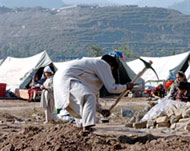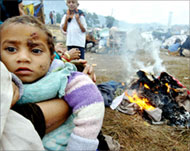Agencies put quake toll at 87,350
The estimated death toll in South Asia’s huge earthquake has jumped to 87,350 after a new count of the dead in Pakistan, while UN workers raced the Himalayan winter to bring shelter to 350,000 of the neediest survivors one month after the disaster.

The toll in Pakistan jumped to 86,000 – or 13,000 higher than the government’s official toll so far – under a broad assessment by the World Bank and Asian Development Bank, working with local governments and aid agencies, Pakistani Finance Ministry official Iqbal Ahmed Khan said on Tuesday.
India has reported 1350 deaths in its territory.
Khan said the new tally for Pakistan came after more bodies were recovered from debris in the quake zone and assessment teams reached areas previously inaccessible due to landslides unleashed by the magnitude 7.6 quake and its hundreds of aftershocks.
“This is their assessment, which we think is fair enough,” Khan said. “They had various teams in the field. This is feedback from the field.”
Conflicting estimates
The central Pakistani government’s official death toll – still at 73,000 – typically has lagged behind other estimates, including those of local provincial governments in the quake-affected areas, whose most conservative estimates have added up to 79,000 for Pakistan for more than two weeks.
 |
|
The UN says it urgently needs |
Aljazeera’s correspondent in Pakistan, Ahmad Zaidan, reports that the situation is still miserable for large numbers of quake survivors.
According to the correspondent, the issue of earthquake relief has two areas of concern.
For one, there is no coordination betweeen the government and international aid agencies on how to distribute aid.
For another, there are differences between the government and donors in their assessments of the scale of destruction and damage inflicted by the quake, Zaidan said.
UN appeal upped
The UN stepped up its appeals for more money to help victims of the 8 October quake, urging donors to be as generous as with other recent disasters and saying it urgently needs $42.4 million to keep bringing help through November.
“What is particularly difficult in Kashmir is that people (will) freeze to death if they don’t get assistance in weeks,” UN humanitarian chief Jan Egeland said in New York on Monday.
 |
|
More than three million people |
“It’s even more urgent than it was in these other hurricanes or tsunamis.”
Egeland urged everyone from individuals to oil-rich nations to contribute.
The UN planned to hold a news conference on Tuesday – one month after the quake – to detail how it must cut back its operations unless it gets more funding.
The quake destroyed the homes of more than three million people across Pakistan’s North West Frontier Province and its portion of Kashmir. Many survivors have moved into tent camps that have been set up in foothills of the Himalayas.
People continue to stream into the Pakistani Kashmir hub of Muzaffarabad, where they receive tents from aid agencies before trudging out of town with canvas and poles on their backs in search of flat ground not already claimed by other survivors.
Disease fears
Some can be seen trekking along the Neelam river up to windy bluffs overlooking the city, where they must dig into the ground with crowbars to carve a shelf big enough to pitch a tent.
But the tent camps pose dangers, because most still lack adequate clean water and sanitation, aid workers say.
“Unless conditions are improved in these camps, diseases like cholera could spread like wildfire,” said quake relief head Jane Cockin of the British charity Oxfam.
“If disease does break out in the camps, the number of deaths could far exceed those in danger in their villages.”
Acute diarrhea, tetanus and measles have killed dozens of people since the quake. The winter could bring hypothermia, pneumonia and other respiratory illnesses.
Winter sets in
The United Nations and the global Red Cross/Red Crescent said on Monday that urgent cash support from the outside world was vital to save thousands of lives as winter moves in on homeless survivors of the Pakistan earthquake.
 |
|
There are fears that diseases |
The UN, struggling to raise $550 million for a medium-term programme to help quake victims and rebuild shattered communities, appealed to donor countries for $42.4 million to fund relief in the region this month.
And the International Federation of Red Cross and Red Crescent Societies, whose calls for funding normally meet a rapid response, said it so far had only 40% of the $117 million it asked for soon after the quake on 8 October.
“This is one of the most complex relief operations ever,” said the federation’s Finnish secretary-general, Markku Niskala. “I am appealing to people and governments around the world to support us in this humanitarian work.”